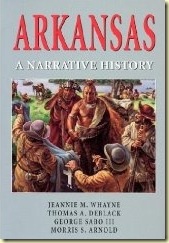I've been reading "Arkansas: A Narrative History" by Jeannie M. Whayne, Thomas A. Deblack, George Sabo III, and Morris S. Arnold.
I picked it up in a Barnes & Noble in North Little Rock on March 24  while Maria was at a seminar in downtown Little Rock. I read a few passages from the comfort of a bookstore armchair, but didn't feel like paying the $34.95 list price.
while Maria was at a seminar in downtown Little Rock. I read a few passages from the comfort of a bookstore armchair, but didn't feel like paying the $34.95 list price.
I came home and looked it up on Amazon.com, but found used copies were still more than $20.
So when my birthday rolled around in July, Maria bought me a copy and I got serious about learning the history of my new home.
Arkansas was a frontier state for a long time and it was relatively late in getting civilized.
But I was stunned when I read this passage about education in pre-Civil War Arkansas:
If organized religion made inroads into antebellum Arkansas, public education largely did not. From its inception, the state lagged behind much of the rest of the nation in the education of its citizens. While there was no public taxation to support the creation and operation of schools, the federal government subsidized education in the state by setting aside the sixteenth section of every township for the support of local schools and two townships for the creation and support of a university. But the revenue generated from leasing these lands proved insufficient to support a public school system, and the problem was compounded by a haphazard system of organization and administration
The effort to establish a viable school system was further hampered by what one state official described as "the indifference that pervades the public mind on the subject of education." As a result, no viable system of public education was established and no public university was founded in the state before the Civil War. Many wealthy Arkansans employed private tutors for their children and opposed the use of tax money for public education. Many poorer Arkansans had neither the time, the money, nor the inclination to pay for their children's education, through taxes or otherwise. Thus, for the majority of the state's citizens, the education system remained a hodgepodge of public schools and private academies manned by underpaid and often incompetent teachers.
A comparison with Michigan, Arkansas's sister state, is revealing. The two states entered the Union within a year of one another (June 1836 and January 1837) and had at the time approximately the same populations. Yet by 1850 Michigan had 2,714 public schools to Arkansas's 353 and 110,445 pupils in public schools compared to Arkansas's 8,493. Michigan derived $88,879 for public schools from taxes, while Arkansas collected $250. Michigan reported 7,912 adult white illiterates, Arkansas 16,819. In addition, Michigan had 280 public libraries containing 65,116 volumes, while Arkansas had one public library with 250 volumes.
Even by Southern standards, Arkansas fared poorly. As late as 1980, when North Carolina enrolled more than two-thirds of its white school population for an average term of four months, about half of Arkansas's school-age children did not attend any school at all. Most of the rest attended only sporadically.
So, given that historical context, I guess I shouldn't be surprised that the American Legislative Exchange Council ranked Arkansas 44th among the 50 states in its 2007 Education Report Card. (Michigan was 33rd and I'm pleased to say my home state of Indiana was 22nd. Minnesota ranked first.)
Comedian Lewis Black, in one of his monologues, quotes former President Bill Clinton as saying more than 100 times during his presidential campaign that one of his proudest accomplishments while he was governor of Arkansas was to raise the state's schools from 50th to 49th place.
"How do you take a school system from 50th to 49th?" Black asked, "What's the miracle? Pencils?"
"I actually have a theory," he said. "I think they shot some dumb kids."
No comments:
Post a Comment